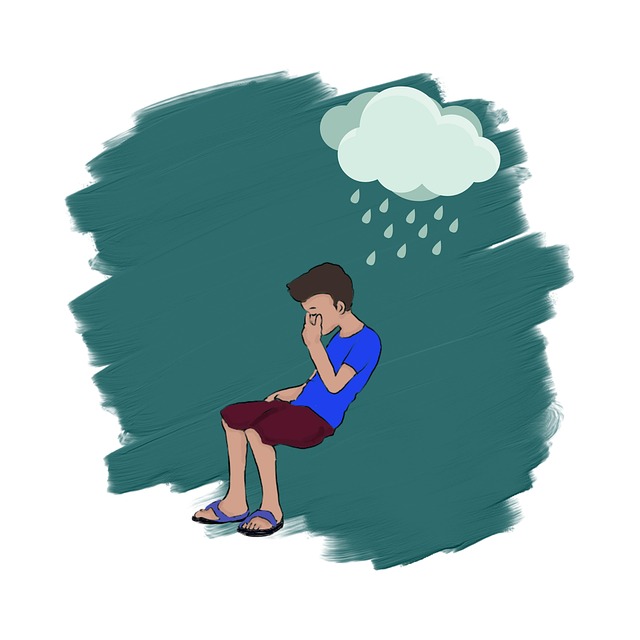Mental health policies, exemplified by Castle Rock Chronic Pain Therapy (CRCPT), are vital in addressing societal challenges related to chronic pain and mental illness. Effective policy analysis involves evaluating existing legislation and initiatives to drive change through awareness campaigns, emotional intelligence education, and burnout prevention. CRCPT highlights the link between chronic pain and mental health, offering a holistic approach with tailored emotional healing processes. Despite public awareness efforts, traditional treatments often fail to address this complex interplay. Innovative solutions like Compassion Cultivation Practices and Mental Wellness Coaching Programs are needed. Advocacy groups promote early intervention, dispel myths, and lobby for policy changes, improving access to specialized treatments like CRCPT programs. This comprehensive approach enhances resilience and quality of life for individuals with chronic pain and comorbid mental health conditions.
Mental health policy analysis and advocacy are critical components in addressing the growing global burden of mental illness. This article explores key areas, from understanding foundational mental health policies to evaluating their effectiveness in managing chronic pain. We delve into innovative approaches like the Castle Rock Chronic Pain Therapy model, showcasing integrated care strategies that enhance access to essential services. Additionally, we discuss advocacy tactics to drive policy changes, ensuring improved mental well-being for all.
- Understanding Mental Health Policy: A Foundation for Change
- The Impact of Chronic Pain on Mental Well-being: A Case Study
- Analyzing Existing Policies and Their Effectiveness in Treating Chronic Pain
- Advocacy Strategies to Improve Access to Mental Health Services
- Castle Rock Chronic Pain Therapy: A Model for Integrated Care
Understanding Mental Health Policy: A Foundation for Change

Mental health policies are a cornerstone for fostering well-being and tackling societal challenges related to mental illness. Understanding these policies is crucial in advocating for much-needed change, especially when addressing specific issues like chronic pain and its impact on individuals’ lives. Castle Rock Chronic Pain Therapy, for instance, highlights the importance of tailored interventions and support systems.
Policy analysis involves scrutinizing existing legislation, guidelines, and initiatives to identify strengths and gaps. By doing so, advocates can push for developments in public awareness campaigns, emotional intelligence education, and burnout prevention strategies. These aspects are essential in creating a supportive environment that addresses mental health challenges effectively, ensuring better outcomes for those seeking help.
The Impact of Chronic Pain on Mental Well-being: A Case Study

Chronic pain, a persistent companion for many individuals, significantly impacts mental well-being. A case study in Castle Rock, focusing on chronic pain therapy, reveals profound connections between physical discomfort and emotional distress. Patients often struggle with low mood, anxiety, and even depression as a result of their condition. The challenge lies in recognizing that managing chronic pain isn’t solely about reducing physical sensation; it’s an intricate process that demands empathy-building strategies.
Therapy sessions, for instance, incorporate emotional healing processes tailored to each patient’s unique experience. Crisis intervention guidance is crucial during these sessions, offering support and tools to cope with the psychological toll of living with chronic pain. By addressing both the physical and mental aspects, Castle Rock Chronic Pain Therapy aims to enhance patients’ overall quality of life, demonstrating a holistic approach essential for effective long-term management.
Analyzing Existing Policies and Their Effectiveness in Treating Chronic Pain

In evaluating the landscape of mental health support, a crucial step is scrutinizing existing policies and their genuine impact on treating chronic pain. Castle Rock Chronic Pain Therapy serves as a microcosm of this broader issue, highlighting both successes and gaps in current systems. Many traditional approaches to managing chronic pain often fall short, leading to a growing recognition of the need for innovative solutions. The effectiveness of these policies is not merely measured by their ability to provide temporary relief but by their long-term impact on patients’ quality of life and overall mental health.
This analysis reveals that while public health initiatives have made strides in raising Mental Health Awareness, there’s a growing emphasis on integrating Compassion Cultivation Practices and Mental Wellness Coaching Programs Development. These holistic approaches aim to address the intricate relationship between chronic pain and mental wellness. By fostering empathy and understanding, these practices can revolutionize care, ensuring patients receive support that transcends medication or surgery, thereby enhancing recovery outcomes.
Advocacy Strategies to Improve Access to Mental Health Services

Advocacy plays a pivotal role in shaping mental health policies and ensuring that individuals receive the support they need for their mental wellness. One effective strategy is to raise awareness about the importance of mental health services, particularly for underserved populations like those dealing with Castle Rock Chronic Pain Therapy. By organizing community events, workshops, and educational campaigns, advocates can dispel myths surrounding mental illness and encourage early intervention. This approach fosters a culture where mental wellness is prioritized, breaking down barriers that often prevent individuals from seeking help.
Additionally, advocacy groups can push for policy changes that improve access to specialized treatments, including Castle Rock Chronic Pain Therapy programs and social skills training, which are crucial for inner strength development. By lobbying governments and healthcare institutions, these groups can ensure that mental health resources are allocated effectively, reaching those who need them most. Strategies such as these contribute to a more comprehensive and inclusive mental health care system, ultimately enhancing the overall well-being of communities.
Castle Rock Chronic Pain Therapy: A Model for Integrated Care

The Castle Rock Chronic Pain Therapy (CRCPT) model offers a compelling example of integrated care for mental health advocacy. This innovative approach prioritizes holistic treatment by addressing both physical and psychological aspects of chronic pain, a common comorbidity with various mental health disorders. CRCPT incorporates evidence-based practices such as cognitive-behavioral therapy, mindfulness techniques, and group support sessions tailored to individuals experiencing persistent pain. By integrating these strategies, the program fosters empathy building among participants and provides them with effective stress management workshops organization.
The success of CRCPT lies in its comprehensive approach, which includes individual therapy, peer support, and education on coping mechanisms. This model not only aids in stress reduction methods but also empowers individuals to navigate their pain management journey with enhanced resilience. By combining mental health advocacy with practical tools for pain relief, CRCPT serves as a game-changer in the field, potentially improving quality of life for those struggling with chronic pain and comorbid mental health conditions.
Mental health policy analysis and advocacy are crucial steps towards creating a more supportive ecosystem for individuals dealing with chronic pain. By understanding the complex interplay between mental health and physical conditions like chronic pain, we can develop effective strategies such as those exemplified by Castle Rock Chronic Pain Therapy. Integrating mental health services into primary care settings proves to be a promising model, improving access and outcomes for patients. This analysis highlights the need for policy changes that prioritize mental well-being, especially in managing chronic pain, leading to a more comprehensive and holistic approach to healthcare.














